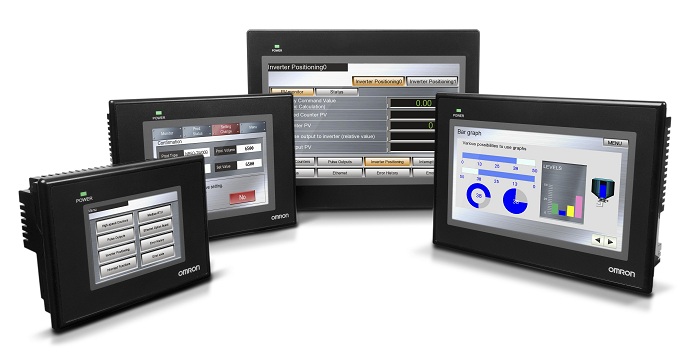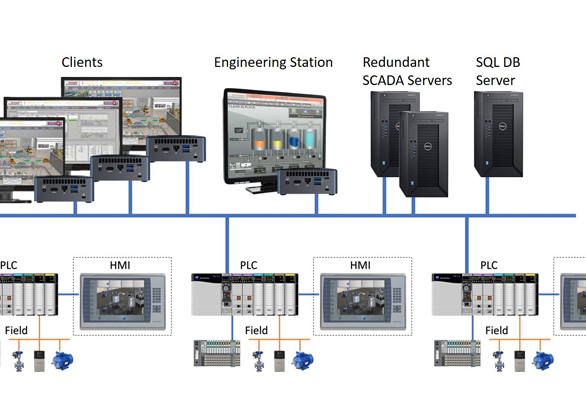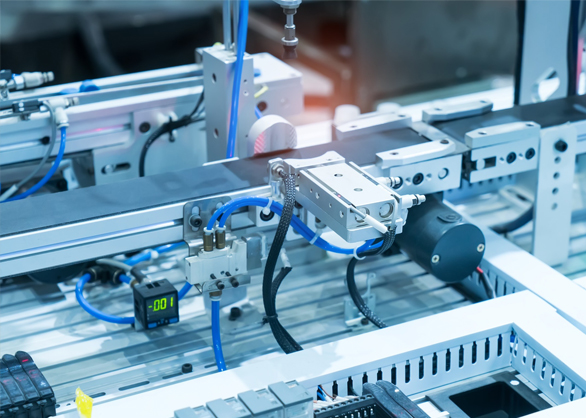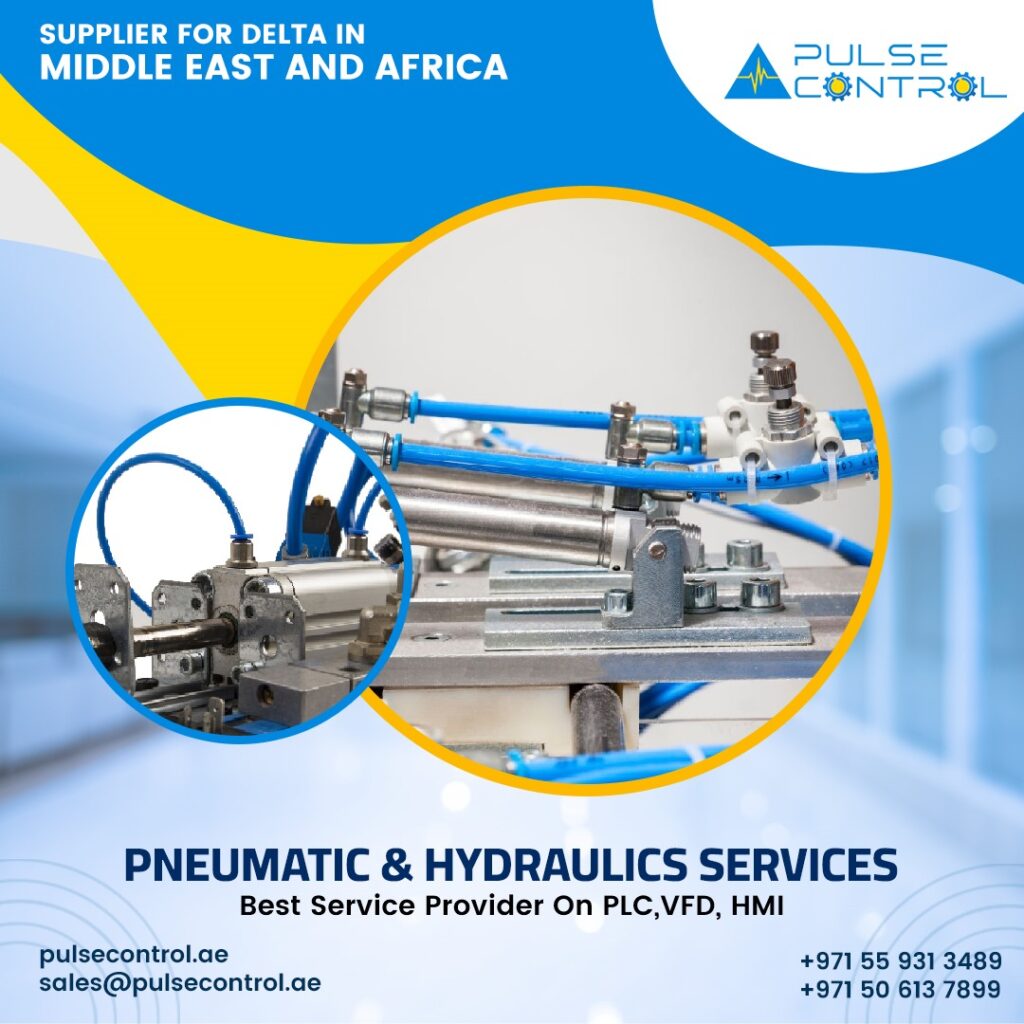
DELTA HMI
Delta HMI (Human-Machine Interface) devices are advanced user interface systems that allow operators to monitor and control industrial machinery and processes. Delta’s HMI units feature intuitive touchscreens with high-resolution displays, enabling operators to visualize real-time data, control settings, and receive alerts directly from connected equipment. They support a range of communication protocols, making them compatible with various PLCs and other automation devices.
Delta’s Human-Machine Interface (HMI) devices are designed to enhance productivity and control in industrial and automation applications. Each feature of Delta HMI is engineered to improve user experience, data accessibility, and the seamless integration of complex systems, making it a key component in modern industrial automation.
1. User-Friendly Interface
Delta HMI devices offer a highly customizable interface that makes it easy for operators to design and set up display screens according to the specific needs of a production environment. Using intuitive, drag-and-drop design tools, users can arrange display elements like indicators, meters, graphs, and alarms in any way they see fit. This level of customization provides clarity to operators by presenting only the most relevant data and control options, minimizing distractions and enabling quick adjustments. Furthermore, Delta’s HMI software often includes templates and libraries that reduce design time and simplify screen creation for repetitive tasks, ensuring that operators of any skill level can interact easily with the interface.
2. High Connectivity
A standout feature of Delta HMIs is their robust connectivity, designed to work with multiple communication protocols to support seamless integration into diverse industrial environments. These HMIs support Ethernet, RS-232/RS-485, Modbus, CANopen, and other industry-standard protocols, enabling the HMI to communicate effectively with various programmable logic controllers (PLCs), sensors, and peripheral devices within a network. This high connectivity allows Delta HMIs to act as centralized hubs for monitoring and controlling multiple machines, offering a holistic view of system operations. Additionally, by supporting multiple protocols, Delta HMIs provide compatibility with a broad range of equipment and automation systems, reducing the need for additional communication modules and simplifying installation and configuration.
3. Robust Build for Industrial Environments
Delta’s HMIs are engineered to withstand the demanding conditions of industrial settings. The devices are built with high-quality, durable materials that offer resistance to dust, moisture, and temperature extremes. Many Delta HMI models are IP-rated, indicating protection against dust ingress and water splashes, making them suitable for use in manufacturing facilities, processing plants, and other rugged environments. This robust build quality ensures that Delta HMI devices can endure continuous operation and harsh environmental conditions without compromising functionality, reducing maintenance requirements and extending the lifespan of the equipment.
4. Data Logging and Analysis
Data collection and storage capabilities make Delta HMIs invaluable for maintaining high production standards and conducting operational analysis. The built-in memory of these devices enables the logging of real-time data, such as temperature, speed, pressure, and operational statuses, directly from connected machinery. By storing this data, Delta HMI devices allow operators to analyze trends, detect anomalies, and conduct predictive maintenance, helping prevent potential issues before they lead to equipment downtime. The data logging capabilities also aid in creating reports and generating insights that can be used to optimize processes, increase productivity, and ensure quality control in manufacturing or processing environments.
5. Remote Monitoring and Control
Delta HMI devices offer advanced remote monitoring features, enabling users to access and control operations from remote locations. With secure remote connectivity options, operators and managers can view real-time status updates, make adjustments, and troubleshoot issues without needing to be physically present on-site. This feature is particularly useful for multi-site operations, where monitoring and control from a centralized location can significantly enhance efficiency. Remote monitoring also allows for quicker response times, as operators can diagnose and resolve issues instantly, reducing the need for on-site intervention and minimizing the impact of unexpected downtime.
Delta HMI devices are sophisticated, user-centric solutions designed to streamline industrial operations and enhance control over automation processes. With a user-friendly, customizable interface, robust connectivity, industrial-grade durability, data logging and analysis tools, and remote monitoring capabilities, Delta HMIs cater to the needs of modern industrial environments. They support seamless integration into complex networks, provide essential data insights, and offer operational flexibility, making them indispensable in driving efficient and reliable automation.

Delta HMIs (Human-Machine Interfaces) have become highly significant in today’s world as industries embrace digitalization, automation, and data-driven decision-making. These devices play a pivotal role in enabling efficient operations, improving safety, and driving productivity across sectors such as manufacturing, healthcare, energy, transportation, and logistics.
Key Reasons for the Global Significance of Delta HMIs:
Streamlining Industrial Automation
As factories and industries move towards automation, Delta HMIs are essential in providing real-time control and monitoring of machinery. They enable operators to manage complex processes through visual interfaces, reducing reliance on manual processes, minimizing errors, and enhancing production efficiency. This functionality is key in high-tech manufacturing sectors, including automotive, electronics, and pharmaceuticals, where precision and productivity are critical.Enhanced Data Analysis and Predictive Maintenance
Delta HMIs support real-time data collection and storage, enabling industries to monitor operations closely and analyze trends. With predictive maintenance capabilities, companies can identify potential issues before they result in costly downtime, increasing equipment lifespan and reducing maintenance costs. This is crucial as industries worldwide focus on minimizing operational costs and enhancing resource efficiency.Improving Operational Safety and Compliance
Industries like oil and gas, construction, and energy operate in high-risk environments where safety is paramount. Delta HMIs allow for continuous monitoring of critical parameters, providing alerts for potential hazards and enabling prompt action. Compliance with safety and environmental regulations is also easier to achieve, as these systems help document and manage necessary safety protocols, supporting industries in meeting strict regulatory standards globally.Sustainability and Energy Efficiency
With global initiatives toward sustainability, Delta HMIs contribute by optimizing energy consumption and reducing waste in industrial processes. By providing data on energy usage and efficiency, these devices help companies in reducing their carbon footprint. This aligns with the growing focus on green technology and energy efficiency, as Delta HMIs aid in resource management and sustainable manufacturing practices.Remote Monitoring and Control Capabilities
Delta HMIs allow for remote access and control, a feature that has gained significance, especially in recent years with the shift toward remote work and decentralized operations. This feature supports industries in managing geographically distributed sites and facilities, enhancing operational flexibility and enabling quick response times to equipment issues from any location.Adaptability and Future-Proofing
In an era of rapidly advancing technology, Delta HMIs offer flexibility and scalability to adapt to new requirements. As industrial automation grows more sophisticated, Delta’s HMIs can integrate with IoT, cloud systems, and other technologies, making them valuable assets in building smart factories. This adaptability is essential for companies planning for long-term digital transformation, ensuring they remain competitive and aligned with modern technological advancements.Global Industrial Integration
Delta HMIs support multiple communication protocols, making them highly compatible with various PLCs (Programmable Logic Controllers) and automation systems. This compatibility is key in today’s globally interconnected industrial systems, where equipment from multiple manufacturers must work together. The cross-industry integration capability of Delta HMIs is essential for creating efficient, standardized, and interconnected industrial ecosystems.
In today’s world, Delta HMIs support industries in meeting the demands for productivity, safety, environmental responsibility, and technological adaptability. They are fundamental in helping industries transition to Industry 4.0, where automation, data integration, and smart systems redefine the global manufacturing landscape.
Pulse Control serves as a key supplier of Delta HMIs across the UAE, other Emirates, and additional regions. This partnership is instrumental in delivering advanced automation solutions to industries in these areas. By providing Delta’s high-quality HMI devices, Pulse Control plays an essential role in enhancing industrial operations across sectors, supporting companies with the tools needed for efficient machine control, process visualization, and data management.
Significance of Pulse Control Supplying Delta HMIs:
Enhanced Regional Accessibility
Pulse Control ensures that Delta HMIs are readily available to businesses in the UAE and other Emirates, making high-tech automation accessible to a wide range of industries. This availability helps companies streamline operations without the need for lengthy import processes, facilitating quicker deployment of automation solutions.Technical Support and Expertise
As an official supplier, Pulse Control provides technical expertise and support for Delta HMI products, helping companies in installation, configuration, and troubleshooting. This local support enables smoother integration and enhances the user experience, making the adoption of Delta’s HMIs more effective for businesses across the region.Supporting Regional Automation Goals
With the UAE and Gulf Cooperation Council (GCC) countries focusing heavily on technological advancement, Pulse Control’s supply of Delta HMIs supports regional automation and digitalization goals. These HMIs enable local industries to meet international standards in automation, enhancing their global competitiveness.Comprehensive Product Range
Pulse Control offers a full range of Delta HMI models, catering to different industrial needs from basic monitoring interfaces to advanced systems with remote access and extensive data analysis capabilities. This allows companies across sectors like oil and gas, manufacturing, and logistics to find the right HMI solutions for their specific requirements.Adaptability for Diverse Industrial Needs
By providing Delta’s HMIs, Pulse Control supports industries in adapting to modern technological demands, including IoT and remote monitoring capabilities. This adaptability is essential as industries continue to grow in complexity and scale across the UAE and other Emirates, where rapid economic development requires cutting-edge automation solutions.
Pulse Control’s role as a supplier of Delta HMIs not only ensures efficient access to advanced HMI technology but also bolsters regional industries in achieving seamless automation, data integration, and improved operational efficiency. Through this partnership, Pulse Control helps drive progress in the automation landscape in the UAE and beyond.



